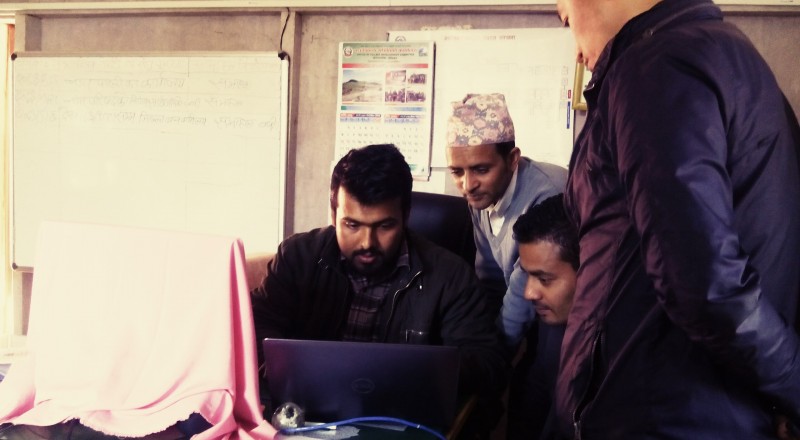As we (I was accompanied by Amir Aryal – ICT Specialist at HERD) took the flight to Bhadrapur on December 18, Sunday from Kathmandu and then opted for road travel to Panchthar – a beautiful hilly district situated in Eastern Nepal, on the way, passing through Ilam in the chilly cold weather, welcoming the fog that frequently disturbed our visibility of lush green hills, it left us wondered and curious to see how MSNP is shaping up in Panchthar.
Two officials from HERD – District Coordinator (DC) and Planning, Monitoring and Information Management Officer (PMIMO) were stationed in District Development Committee (DDC) office of Phidim, Panchthar to support MSNP activities in the district from mid-November, 2016. It was anticipated that with the additional support received through two new human resources to effectively plan and execute MSNP activities in 28 districts (including Panchthar), the vision of the Government of Nepal (GoN), especially National Planning Commission (NPC) to improve maternal and child nutritional status would be materialised.
As we reached Panchthar in late afternoon, our DC, Anil Neupane and PMIMO, Bhagiman Lingden greeted us with great warmth and affection. We discussed with them about the progress so far made in relation to the MSNP activities conducted in the district. We were impressed by their achievements but also left us wondered how and whether all sectoral agencies were on board in terms of driving the national campaign of MSNP.
As per the scheduled plan, Amir and I attended the meeting of sectoral focal persons to discuss and jointly plan the MSNP activities for this fiscal year. The meeting was organised at District Health Office (DHO) building and coordinated by MSNP focal person of DDC. We met the Acting Local Development Officer (LDO) – Mr Bhanubhakta Baral and exchanged greetings. Mr Baral, in his opening remarks during the meeting provided a strategic headway to the sectoral focal persons to emphasise on more output-oriented activities and avoid any duplication of efforts through a collaborative effort of all sectoral agencies. It was a loud and clear message to all sectoral agencies – including the non-government partners such as Suaahara to design and prioritise interventions based on local needs assessment and rather take a holistic approach to development planning and cost effective resource allocation.
With this strategic guidance, focal persons of various sectors (health, education, WASH, agriculture, livestock, women, children and social welfare) discussed separately and jointly to come up with their sectoral district plan for MSNP. As observers to the meeting, it was an interesting exercise for us to note how development planning could be done in an integrated manner. Yes, there were differences and arguments between the focal persons during the discussion especially in terms of selecting focus intervention sites (VDCs), range of activities to be conducted and the resource allocation but ultimately they came up with a draft strategic plan at the end of the day, which was a great achievement.
The following day, as scheduled to conduct the District Level Nutrition and Food Security Steering Committee (DLNFSSC) meeting, the draft plan was presented among the committee members and agreed among the meeting participants. Henceforth, the sectoral plans were endorsed by the DDC through a joint decision of the committee members to carry forward the district plan to implement MSNP activities for this fiscal year and request for the allocated budget accordingly.
As observers to this wonderful exercise, we were impressed by the extent to which development planning is executed in Panchthar district with great commitment and ownership shown by the district. It was also pleasing to see the level of effort put in by DC and PMIMO based at DDC to drive the MSNP agenda forward with extensive exercise of understanding the nuances of bottom up planning, collecting evidence and reviewing national MSNP planning guidelines and facilitating the discussions with sectoral agencies in order to contextualise 'nutrition specific' and 'nutrition sensitive' interventions based on local requirements.
HERD, with the technical and managerial support of UNICEF and funding support from European Commission, under the guidance of Ministry of Federal Affairs and Local Development has initiated this support to effective implementation of MSNP. With promising sight of Panchthar, it gives a clear message that effective engagement of sectoral agencies and ownership from the key actors in the district can drive the MSNP agenda forward.



Comments(0)
No comments found.